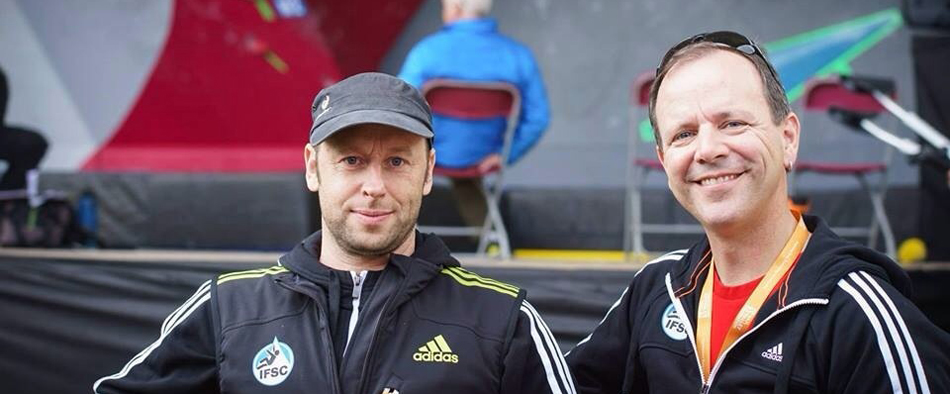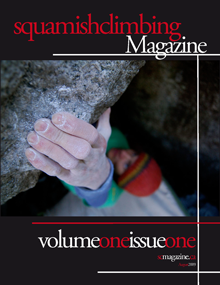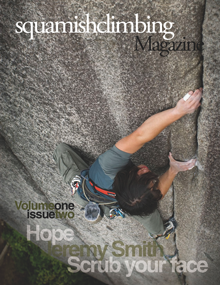This weekend The Boulders climbing gym, located in Saanich, BC, will play host to The Triple Header. The Triple Header is a sanctioned Sport Climbing BC event that will host competitors in all three disciplines: Bouldering, Difficulty, and Speed. As with any competition, a lot of work goes into the event behind the scenes. Squamish Climbing Magazine thought it might be cool to shift the lens and get the perspective of someone on the inside of it. Paul Ledet is the Head Judge for the event this weekend. Paul has also been a high school teacher in the Saanich district for 22 years. Here is what he had to say.

Paul Ledet (right) at Vail World Cup with Johannes Altner (left).
Hi Paul. First off thanks for doing an interview for us at Squamish Climbing Magazine. A big event this weekend on the island. Can you tell us a little bit about your involvement?
Hi Tim. My pleasure! Yes, this will be a big event and a new format for us. I don’t believe we have ever run all three disciplines at a sanctioned comp. My involvement will consist of, among other things, running a technical meeting for the athletes and coaches, overseeing the judging of the competition, dealing with appeals, and making sure that the results are accurate.
What does it take to be a head judge for such an event?
Hmm. Well first off, experience judging in all the relevant disciplines is required. I was fortunate to have a number of wonderful mentors like Moira Bradford (BC) and Craig Eveliegh (AB) that allowed me work with them at local, provincial, and national events, effectively learning on the job. Different people will have different ideas on this but I really think it’s important to realize that the head judge is there to support her or his team. They need to be familiar with the rules, organized, and focused on the task of making sure that the athlete has the best possible competitive experience.
How did you get involved with Sport Climbing BC?
I have been involved with the Boulders since it’s inception as the Cage at Stelly’s School in 1993. When The Boulders started running competitions, I volunteered to judge at the bouldering events and when they opened up the big wall, I started judging difficulty as well. I have been involved with the SCBC since its inception, with an interest in helping develop a curriculum for basic and advanced judging courses.
Is there any specific training that goes into being a Head Judge at a contest such as this?
There is no specific training currently offered at the provincial or national level that I am aware of but the IFSC does offer training from time to time. The SCBC and the CEC supported my application to participate in the IFSC Judges course which took place at the Hamilton World Cup Bouldering event and at the Youth World Championships at the Boulders in 2013. This was a great opportunity to work with a team (Craig Eveliegh (AB), Angelika Eirisch (AB), and Jeff Whattam (ON) of hard working and dedicated judges under the tutelage of some very experienced International level Jury Presidents.
Are there any specific things you look at when judging the competition as a whole?
As head judge, there are a number of things to be aware of, from the opening and closing times for isolation and the posting of start lists, to the allocation of judges. When the competitors are climbing, the judges run their route and, unless there is some obvious mistake, my job is simply to support them and make sure that the comp is running as smoothly and as safely as possible.
Do you have a team of volunteers that stay with each climber during their tries?
We have great teams of volunteers at all of our comps. Our judges will typically be assigned to a boulder problem or a difficulty route and stay on the route for all of their climbers (could be as little as 10 or as many as 40 or more depending on how the organizers combine categories) This ensures consistency in how climbers are scored on a route or on a boulder.
What kind of training do the volunteers go through?
If you are talking about our volunteer judges (and there are so many other volunteers necessary to run a comp.), they have all taken a beginners judging course and some have taken an advanced course as well. It is expected that judges will familiarize themselves with the rules first, then we can go over questions, review common areas that have been found to be challenging, analyze video clips of difficult scoring situations and discuss what their job will consist of on the day of the comp. We always try to pair a new judge with an experienced judge for our comps.
What happens when a climber disagrees with a volunteer?
If a climber or their coach disagrees with how they have been scored, the coach or a team official can submit an appeal. There is a fee for the appeal. At provincial and national competitions, all climbs are video taped. The head judge, and a technical delegate from the SCBC will review the climb and determine if there was a mistake was made in the scoring. If the appeal is successful, the fee is returned to the team official. If it is not successful, the fee is turned over to the SCBC.
What format will the contest use this weekend?
This question is probably best left to the event organizer, Sebastian Powell.
Does having all three disciplines in one event present challenges to you and your team?
Not particularly. It is more of a logistical issue for the organizers but I do know they have things well under control. The biggest challenge is making sure that we have a large enough team of volunteer judges to handle the volume. Our volunteer co-ordinator is amazing though and has things well in hand. That said, volunteers are the lifeblood of these competitions. without them, the comps simply wouldn’t run!
Thanks Paul! Good luck this weekend from Squamish Climbing Magazine!













